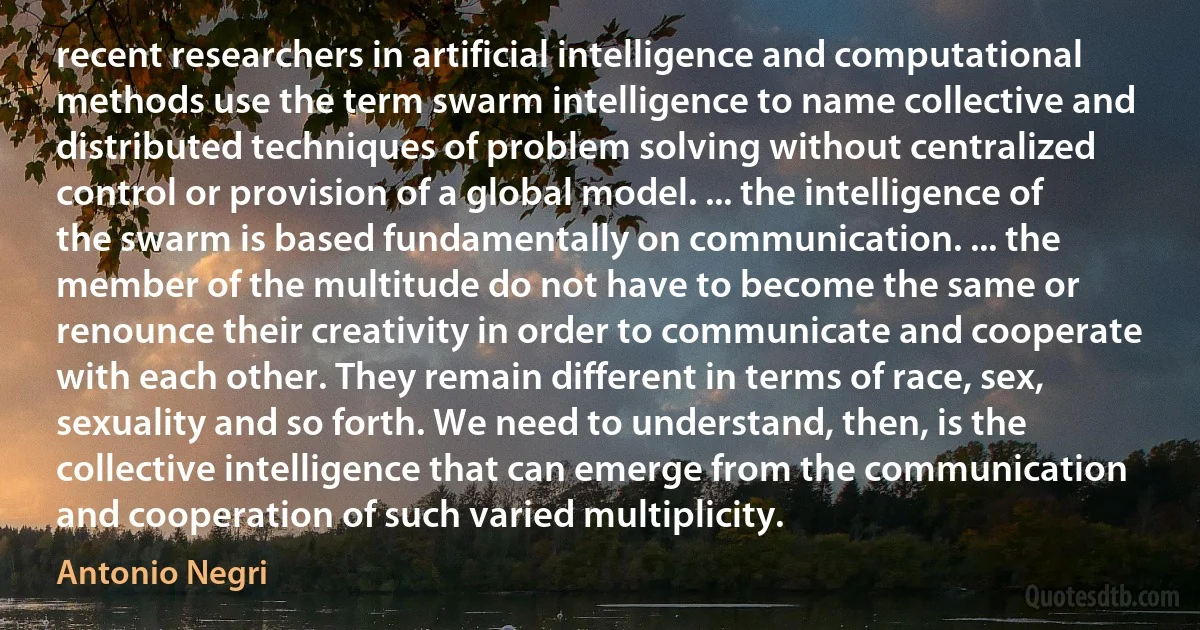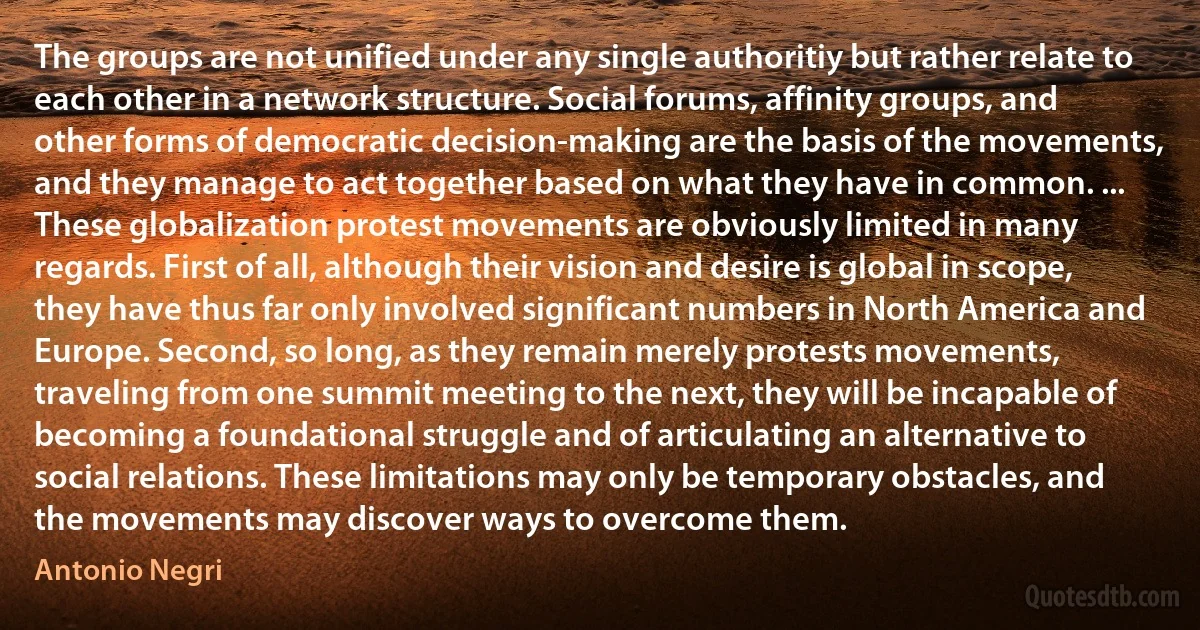Antonio Negri quotes
Just sit back and listen to some of the clamorous grievances against the contemporary global system. Our list does not pretend to be comprehensive, and the partiality of its selections will undoubtedly reveal our own blindnesses, but it should nonetheless give a sense of the range and depth of today's grievances.

Antonio Negri
The poor are thought to be dangerous, either morally dangerous because they are unproductive social parasites - thieves, prostitutes, drug addicts, and the like - or potentially dangerous because they are disorganized, unpredicatble, and tendentially reactionary. In fact the term lumpenproletariat (or rad proletariat) has functioned for times to demonize the poor as a whole. ... The industrial reserve army is a constant threat hanging over the heads of the existing working class because, first of all, its misery serves as a terrifying example to workers of what could happen to them, and, second, the excess supply of labor it represents lowes the costs of labor and undermines workers' power against employers (by serving potentially as strike breakers, for example).

Antonio Negri
postmodern warfare thus has many of the characteristics of what economists call post-Fordist production: it is based on both mobility and flexibility; it intergrates intelligence, information, and immaterial labor; it raises power up by extending militarization to the limits of outer space, across the surfaces of the earth, and to the depths of the oceans.

Antonio Negri
The old form of trade union, which was born in the nineteenth century and aimed primarily at negotiating wages for a specific trase is no longer sufficient. First of all, as we have been argueing, the old trade unions are not able to represent the unemployed, the poor, or even the mobile and flexible post-Fordist workers with short term contracts, all of whom participate actively in social production and increase social wealth. Second, the old unions are divided according to the various products and tasks defined in the heyday of industrial production - a miners' union, a pipefitters' union, a machinists' union and so forth. Today, insofar as the conditions and the relations of labor are becoming common, these traditional divisions (or even newly defined divisions) no longer make sense and serve only as an obstacle. Finally the old unions have become purely economic, not political, organization.

Antonio Negri
conventional terms such as service work, intellectual labor, and cognitive labor all refer to aspects of immaterial labor, but none of them captures its generality. As an initial approach, one can concieve immaterial labor in two principle forms. The first for refers to labor, that is primarily intellectual or linguistic such as problem solving, symbolic and analytical tasks, and linguistic expressions. This kind of immaterial labor produces ideas, symbols, codes, texts, linguistic figures, images and other such products. We call the other principle form of immaterial labor "affective labor."

Antonio Negri
Today we have arrived at a point when the thre principles [of modern resistance: 1. measure of efficacy, 2. the form of political and military organization correspond to the currest forms of economic and social production, 3. democracy and freedom] coincide. The distributed network structure provides the model for an absolutely democratic organization that corresponds to the dominant forms of economic and social production and is also the most poweful weapon against the rulin power structure.

Antonio Negri
The regular rhythms of factory production and its clear divisions of work time and nonwork time tend to decline in the realm of immaterial labor. Think how at the high end of labor market companies like Microsoft try to make the office more like home, offering free meals and exercise programs to keep employees in the office as many of their waking hours as possible. At the low end of the labor market workers have to juggle several job to make ends meet. Such practices always existed, but today, with the passage from Fordism to post-Fordism, the increased flexibility and mobility imposed on workers, and the decline of the stable, long-term employment typical of factory work, this tends to become the norm. At both the high end and low ends or labor market the new paradigm undermines the division between work time and the time of life.

Antonio Negri
Some economists also use the terms Fordism and pos-Fordism to mark the shift from an economy characterized by the stable-long-term employment typical of factory workers to one marked by flexible, mobile, and precarious labor relations: flexible because workers have to adapt to different tasks, mobile because workers have to move frequently between jobs, and precarious because no contracts guarantee stable, long-term employment. Whereas economic modernization, which developed Fordist labor relations, centered on the conomies of scale and larga systems of production and exchange, economic postmodernization, with its post-Fordist labor relations, develops smaller-scale, flexible systems.

Antonio Negri
Immaterial labor has become hegemonic in qualitative terms and has imposed a tendency on other forms of labor and society itself. Immaterial labor, in other words, is today in the same position that industrial labor was 150 years ago, when it accounted for only a small fraction of global production and was concentrated in a small part of the world but nonetheless exerted hegemony over all other forms of production. Just as in that pgase all forms of labor and society itself had to industrialize, today, labor and society have to informationalize, become intelligent, become communicative, become affective.

Antonio Negri
The legacy of modernity is a legacy of fratricidal wars, devastating "development," cruel "civilization," and previously unimagined violence. Erich Auerbach once wrote that tragedy is the only genre that can properly claim realism in Western literature, and perhaps this is true precisely because of the tragedy Western modernity has imposed on the world.

Antonio Negri
The contradictory conceptual couple, identity and difference, is not the adequate framework for understanding the organization of the multitude. Instead we are a multiplicity of singular forms of life and at the same time share a common global existence. The anthropology of the multitude is an anthropology of singularity and commonality.

Antonio Negri



